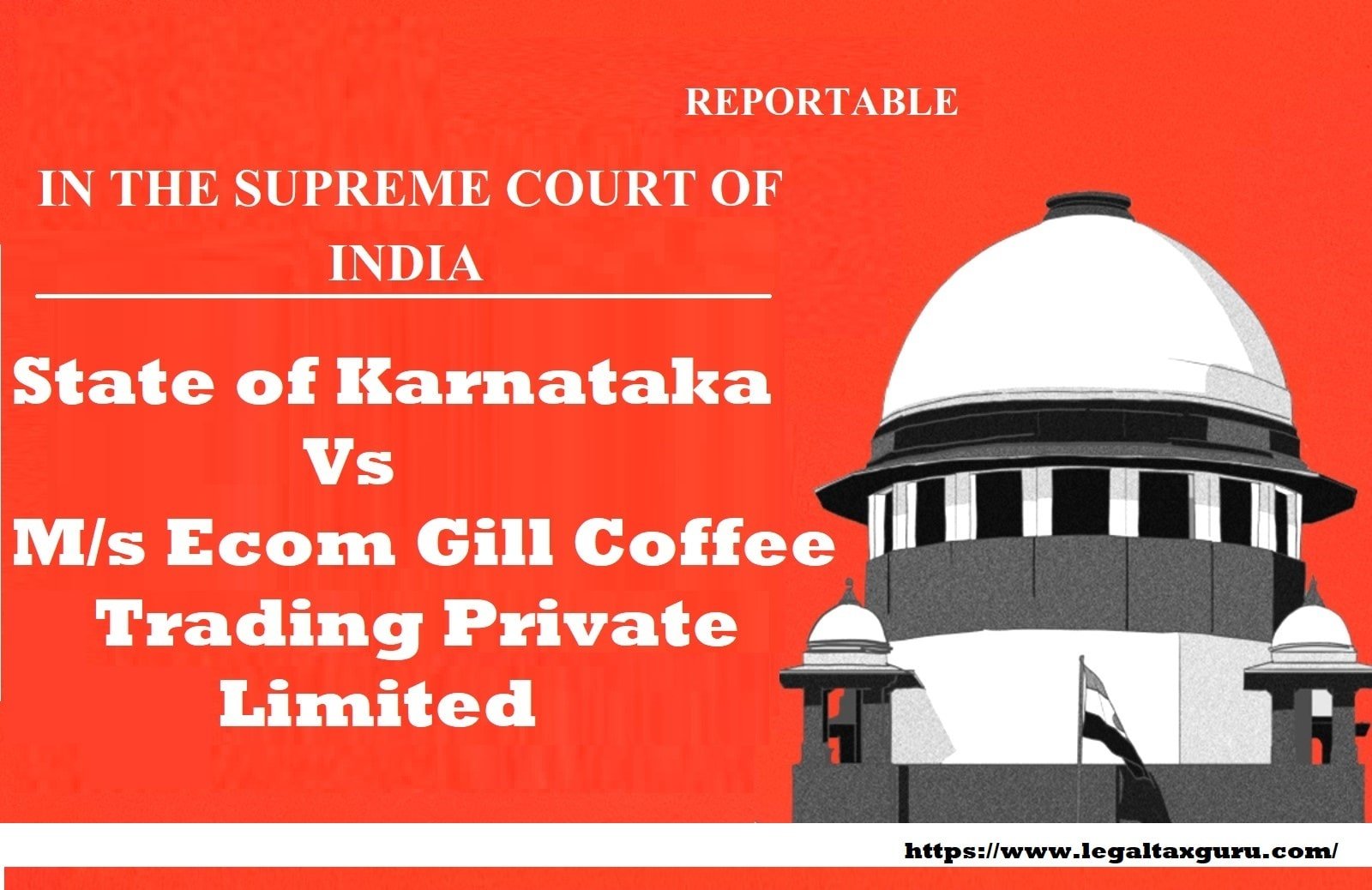“Supreme Court of India: The Honorable Supreme Court has acknowledged that the burden of proving the claimed Input Tax Credit lies with the purchasing dealer.
REPORTABLE
IN THE SUPREME COURT OF INDIA
State of Karnataka
Vs
M/s Ecom Gill Coffee Trading Private Limited
Appeal Number: Civil Appeal No. – 230 of 2023
Date of Judgement/Order: 13/03/2023
RULING:
In the present case, Hon. Supreme Court has observed that the provisions of Section 70, quoted hereinabove, in its plain terms clearly stipulate that the burden of proving that the ITC claim is correct lies upon the purchasing dealer claiming such ITC. Merely because the dealer claiming such ITC claims that he is a bona fide purchaser is not enough and sufficient. Such a burden of proof cannot get shifted to the revenue. Mere production of the invoices or the payment made by cheques is not enough and cannot be said to be discharging the burden of proof cast under section 70 of the KVAT Act, 2003.
Section 70 of the Karnataka Value Added Tax Act, 2003
“70. Burden of proof.-
- For the purposes of payment or assessment of tax or any claim to input tax under this Act, the burden of proving that any transaction of a dealer is not liable to tax, or any claim to deduction of input tax is correct, shall lie on such dealer.
- Where a dealer knowingly issues or produces a false tax invoice, credit or debit note, declaration, certificate or other document with a view to support or make any claim that a transaction of sale or purchase effected by him or any other dealer, is not liable to be taxed, or liable to tax at a lower rate, or that a deduction of input tax is available, the prescribed authority shall, on detecting such issue or production, direct the dealer issuing or producing such document to pay as penalty:
- (a) in the case of first such detection, three times the tax due in respect of such transaction or claim; and
- (b) in the case of second or subsequent detection, five times the tax due in respect of such transaction or claim.
- Before issuing any direction for the payment of the penalty under this Section, the prescribed authority shall give to the dealer the opportunity of showing cause in writing against the imposition of such penalty.”
Important Paras
Para No:- 14.
Now so far as the reliance upon the decision of the Delhi High Court in the case of On Quest Merchandising India Pvt. Ltd. v. Government of NCT of Delhi (Writ Petition (Civil) No. 6093/2017, decided on 26.10.2017), relying upon by the learned counsel appearing on behalf of the purchasing dealers is concerned, at the outset, it is required to be noted that before the Delhi High Court, Section 9(2)(g) of the Delhi Value Added Tax Act was under consideration, which reads as under:
“9(2)(g) to the dealers or class of dealers unless the tax paid by the purchasing dealer has actually been deposited by the selling dealer with the Government or has been lawfully adjusted against output tax liability and correctly reflected in the return filed for the respective tax period.”
The burden of proof as per Section 70 of the KVAT Act, 2003 was not an issue before the Delhi High Court. How and when the burden of proof can be said to have been discharged to prove the genuineness of the transactions was not the issue before the Delhi High Court. As observed hereinabove, while claiming ITC as per section 70 of the KVAT Act, 2003, the purchasing dealer has to prove the genuineness of the transaction and as per section 70 of the KVAT Act, 2003, the burden is upon the purchasing dealer to prove the same while claiming ITC.
Para No:- 15.
In view of the above and for the reasons stated above and in absence of any further cogent material like furnishing the name and address of the selling dealer, details of the vehicle which has delivered the goods, payment of freight charges, acknowledgement of taking delivery of goods, tax invoices and payment particulars etc. and the actual physical movement of the goods by producing the cogent materials, the Assessing Officer was absolutely justified in denying the ITC, which was confirmed by the first Appellate Authority.
Both, the second Appellate Authority as well as the High Court have materially erred in allowing the ITC despite the concerned purchasing dealers failed to prove the genuineness of the transactions and failed to discharge the burden of proof as per section 70 of the KVAT Act, 2003. The impugned judgment(s) and order(s) passed by the High Court and the second Appellate Authority allowing the ITC are unsustainable and deserve to be quashed and set aside and are hereby quashed and set The orders passed by the Assessing Officer denying the ITC to the concerned purchasing dealers, confirmed by the first Appellate Authority are hereby restored.
- No GST on Penalties, Late Fees/Panel Interest, fine levied or collected by RBI: GST AAR MAHARASHTRA
- FINANCE BILL 2024: INSERTION OF NEW SECTION 128A IN CGST ACT 2017
- FINANCE BILL 2024: INSERTION OF SECTION 74 A IN CGST ACT, 2017
- Finance Bill 2024: Amendment to Section 16 of CGST Act, 2017
- UNION BUDGET 2024: KEY HIGHLIGHTS ON INCOME TAX

